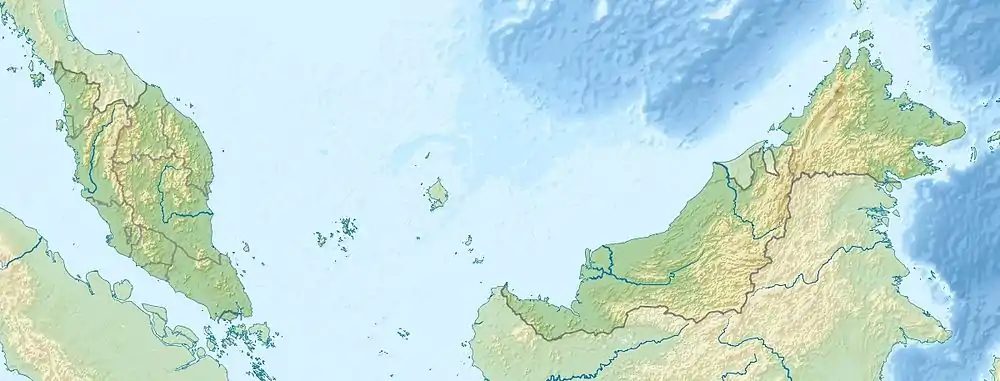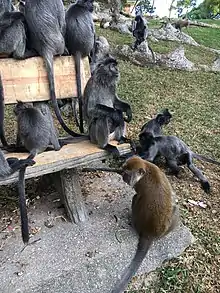Bukit Melawati
Bukit Malawati or Malawati Hill is a hill in Malaysia near Kuala Selangor.
| Bukit Malawati | |
|---|---|
 Cannons at Bukit Malawati overlooking the Strait of Malacca | |
| Highest point | |
| Coordinates | 3°20′31″N 101°14′46″E |
| Naming | |
| English translation | Malawati Hill |
| Language of name | Malay |
| Geography | |
 Bukit Malawati | |
| Geology | |
| Mountain type | Hill |
Bukit Malawati is a popular tourist attraction.[1] The hill overlooks the Strait of Malacca and has a lighthouse as well as the remains of the Kota Malawati fort.[1][2][3] The fort was built in the late 1700s by Sultan Ibrahim of Selangor to protect against Dutch invaders but the Dutch captured it a renamed it Fort Altingburg. Sultan Ibrahim recaptured the fort in 1785 but it was eventually destroyed during the Selangor Civil War.[2][4] The Altingsburgh Lighthouse was built by the Dutch in 1794.[5]

Another attraction of Bukit Malawati is the presence of silvered leaf monkeys and long-tailed macaques, which are provisioned by tourists.[1][2][4][5] The silvered leaf monkeys at Bukit Malawati are habituated to humans and sometimes willingly touch and climb on visitors, in addition to approaching to beg for food.[5] Attractions also include a tram ride, a royal mausoleum and a museum.[1][3][5] The hill is located near additional tourist attractions, Kampung Kuantan Firefly Park and Kuala Selangor Nature Park.[1][4]
References
- "Bukit Malawati". visitselangor.com. Retrieved 2018-08-31.
- "Bukit Malawati - Kuala Selangor , Selangor Malaysia". JourneyMalaysia.com. Archived from the original on 2018-09-01. Retrieved 2018-08-31.
- Rajendra, Edward. "Abandoned facilities in Kota Malawati disappoint visitors". Star Media Group. Retrieved 2018-08-31.
- Leong, Ewe Paik (2017). "More than fireflies in Kuala Selangor". New Straits Times. Retrieved 2018-08-31.
- Md. Zain, Badrul Munir; Mohd. Daut, Norlinda & Md. Nor, Shukor (2009–2010). "Characterizing Silvered Leaf Monkey–Visitor Interactions at Bukit Malawati, Kuala Selangor, Malaysia" (PDF). The Journal of Wildlife and Parks. 26: 83–94. Retrieved 2018-09-01.